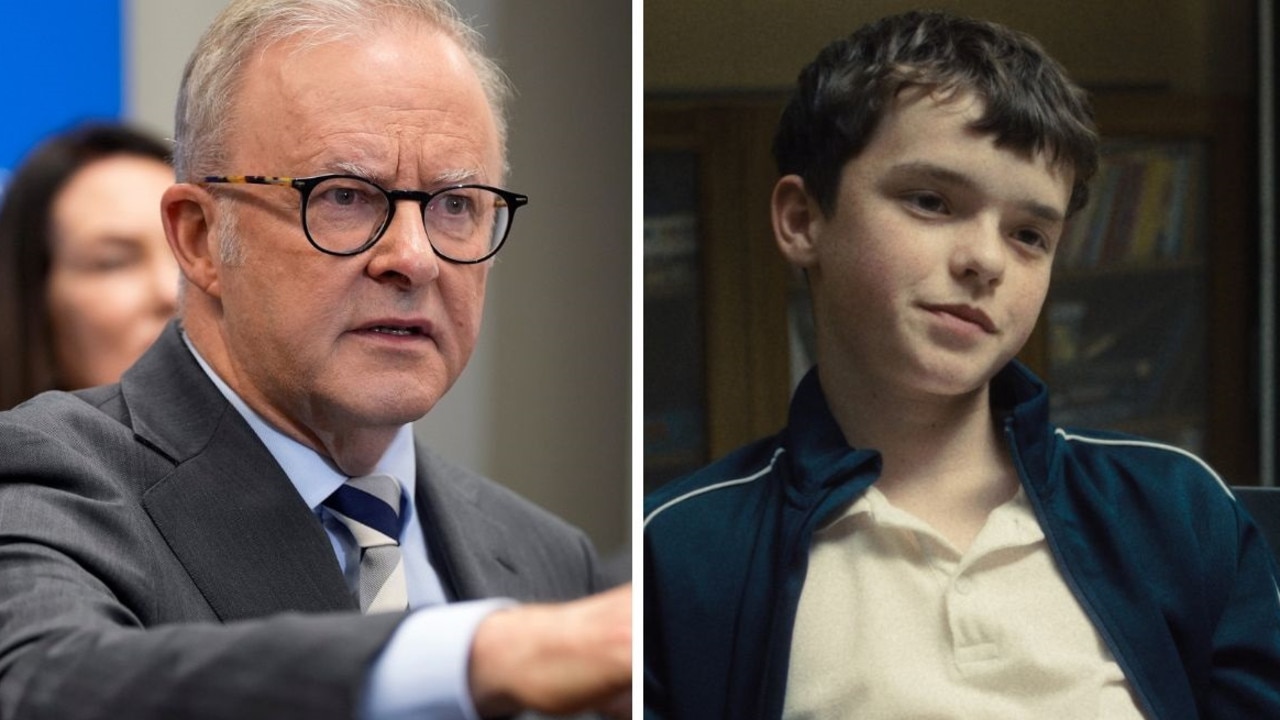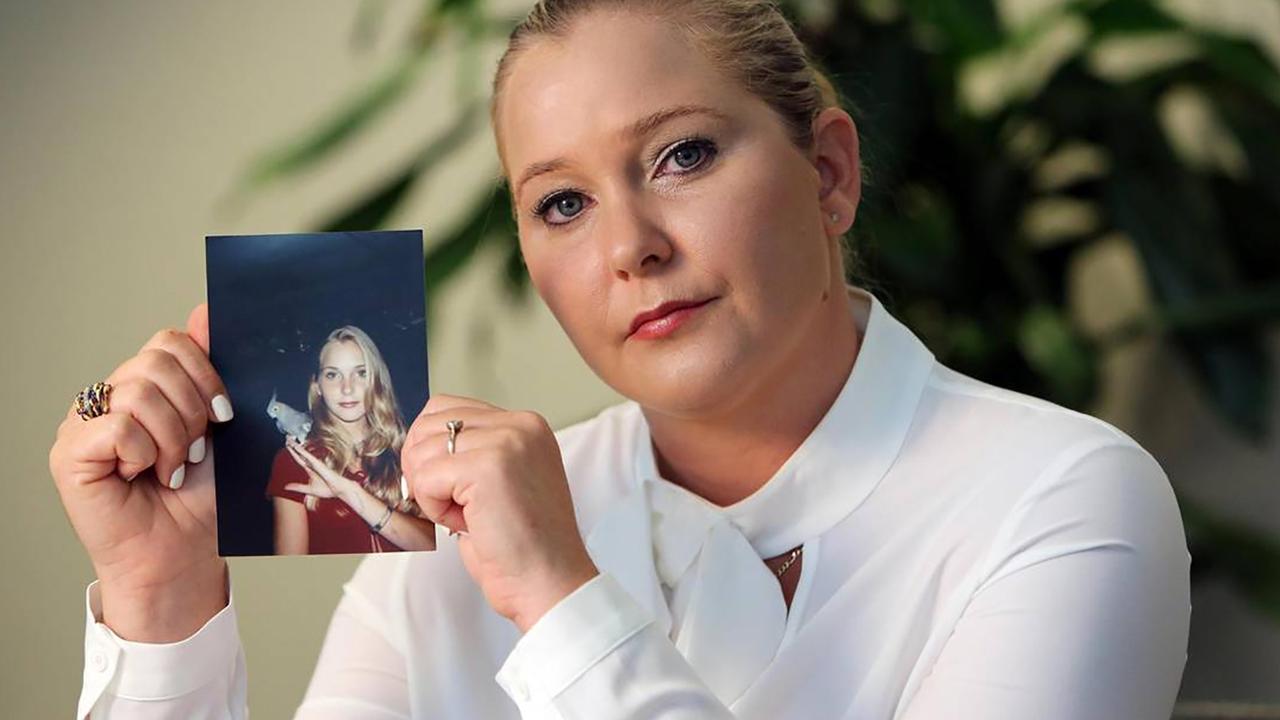Facebook CEO Mark Zuckerberg to answer tough questions that could change social media
ANALYSIS: It’s the social media scandal that won’t go away, and this week Facebook will face questions worldwide that may change the way it operates forever.
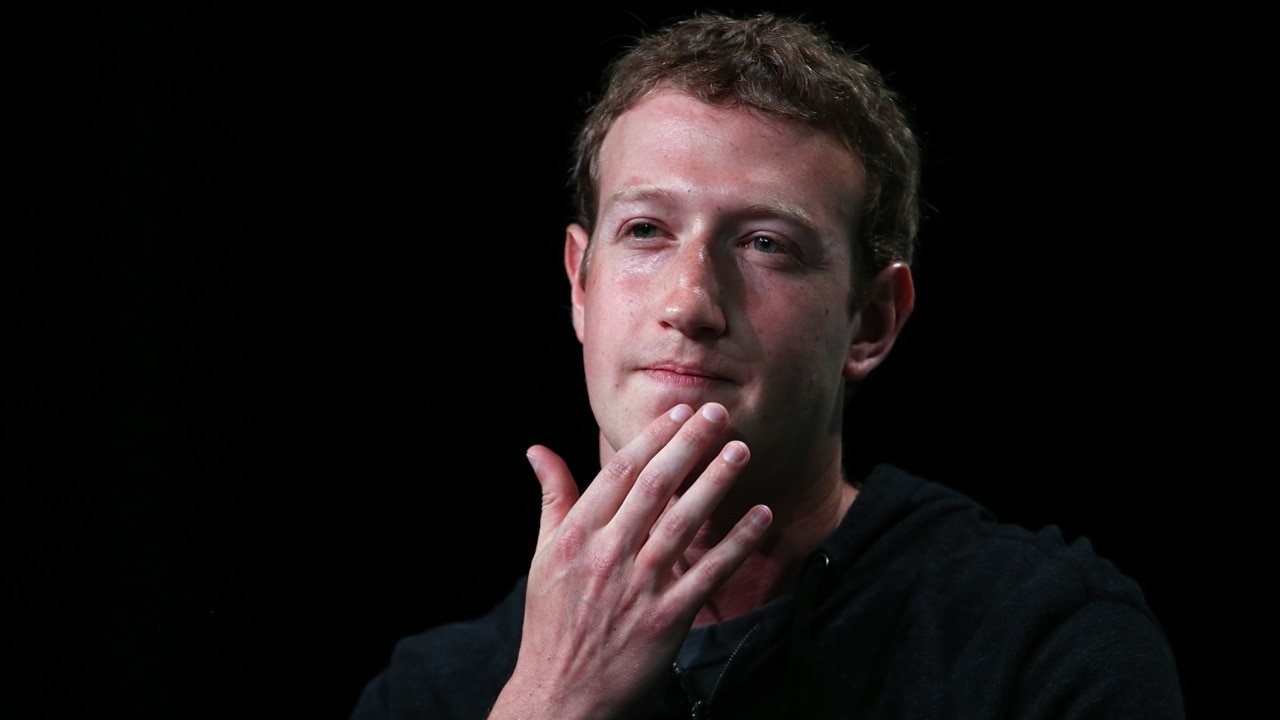
Social
Don't miss out on the headlines from Social. Followed categories will be added to My News.
FOR FIVE days following revelations Facebook shared some of the most private information about millions of users, its founder said nothing.
Facebook creator and chief executive Mark Zuckerberg, along with his right-hand woman, chief operating officer Sheryl Sandberg, remained behind closed doors, privately problem-solving the widening Cambridge Analytica scandal in the apparent belief, like other controversies Facebook had faced, it would soon be forgotten.
Billions of dollars have since been wiped from Facebook’s stock market value, major advertisers have pulled their business, and a vocal uprising of users have deleted their profiles in protest.
And the scandal seems to deepen each day, with revelation the company collects users’ phone and text message data, planned to use hospital patients’ data to identify their online profiles, and even deletes private messages Zuckerberg sent to journalists.
It’s now clear Facebook will have to publicly explain itself to survive and, this week, it will have to do so on the world stage.
Zuckerberg is due to appear before two US congressional inquiries starting on Tuesday, but America is not alone in requesting the multibillionaire’s presence and his answers to tough questions.
Countries as diverse as Indonesia, Nigeria, and the United Kingdom are holding inquiries into how their citizens’ personal information has been exploited, sold, and used to influence elections, and whether Facebook can be trusted with users’ data and to stay out of the political process.
Those countries now include Australia, where authorities are formally investigating the data breach and potential regulations on Facebook’s operation, which privacy experts predict will be the inevitable outcome of such a high-profile transgression.
MORE: Facebook tells users if privacy breached, gives new powers
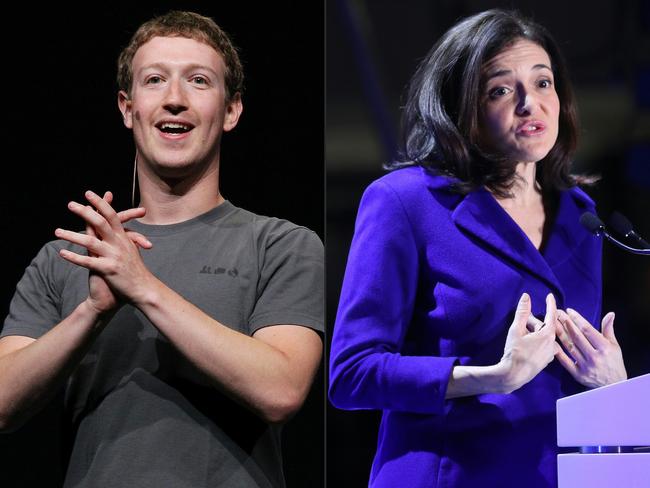
Facebook first plunged into scandal on March 16, following allegations the political data firm Cambridge Analytica was still using personal and private information harvested from as many as 87 million Facebook users, including more than 311,000 Australian profiles.
The private details, including religious beliefs, political views, likes, and friendships, were used to build a powerful personality prediction tool and target highly specific political advertisements at voters to influence elections.
Lawmakers around the world are now seeking to probe what Cambridge Analytica really did with the information, which election outcomes may have been changed by the practice, and what can be done to shut it down.
And that’s in addition to questions about the unprecedented worldwide data theft from unconsenting users.
Questions on both will be asked in two US congressional hearings this week at which Zuckerberg is confirmed to appear.
The first is a joint US Senate Judiciary and Commerce Committee hearing into data privacy issues on April 10, while the second is a sitting of the House Energy and Commerce Committee the following day, about which Committee chairman Greg Walden and member Frank Pallone issued a statement praising Zuckerberg’s “willingness to testify”.
“The hearing will be an important opportunity to shed light on critical consumer data privacy issues and help all Americans understand what happens to their personal information online,” they say.
Questions of the social media figurehead are likely to be pointed, as Facebook revealed more than 87 million Americans had data stolen as part of the Cambridge Analytica breach, but the committees won’t work alone.
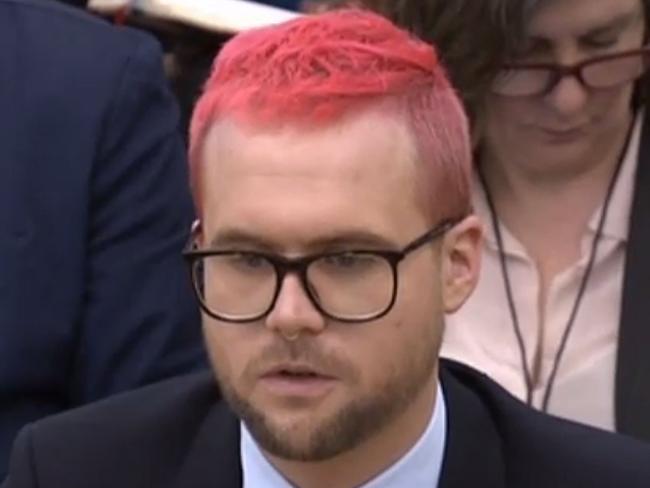
America’s Federal Trade Commission is also investigating whether Facebook breached its 2011 agreement to obtain the consent of its users before sharing their information.
Each violation of this agreement could attract a $US40,000 penalty, putting potential fines in hundreds of millions of dollars.
Australia may issue its own multimillion-dollar fines against the social media giant after the Office of the Australian Information Commissioner last week launched a formal investigation into Facebook.
Acting Commissioner Angelene Falk says the inquiry will look into whether Facebook breached the Privacy Act by sharing the details of up to 311,127 Australians, and if Facebook met its data safety requirements.
“All organisations that are covered by the Privacy Act have obligations in relation to the personal information they hold,” she says. “This includes taking reasonable steps to ensure that personal information is held securely and ensuring that customers are adequately notified about the collection and handling of their personal information.”
The OAIC can issue $2.1 million fines but, critically, can also impose “enforceable undertakings” on companies breaching the legislation.
La Trobe University information law and policy professor David Watts says Australian authorities will find it difficult to prosecute the multinational company, and is unlikely to compel Zuckerberg himself to answer questions, but the addition of regulations from Australia and other countries is inevitable.
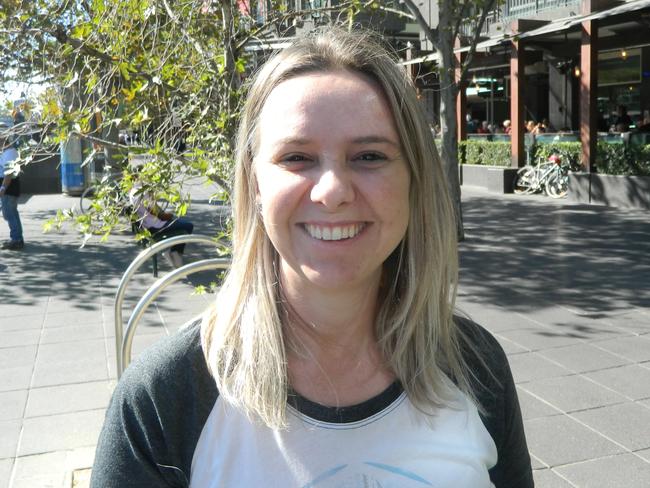
“It’s not going to happen immediately but these organisations are going to be regulated. That is what’s coming,” the former Victorian privacy commissioner says.
“It’s just like the oil barons and the railroad trucks in the US in the early 1900s. They were the wealthiest companies on Earth, they had a lot of power, and they were regulated.
“We regulate the media now, print and broadcast media. My prediction for the future is that countries will start saying ‘we have control of our own territories and therefore we can exercise control over some of these transnational organisations that operate in our country and we’re going to’.”
Facebook will also face questions from the Australian Competition and Consumer Commission, whose Digital Platforms Inquiry will look into how companies like it and Google “affect the quality and range of news supplied to Australian consumers”.
The inquiry is expected to report preliminary findings in December.
Other Facebook inquiries are being held in the United Kingdom, where the Information Commissioner raided Cambridge Analytica to determine whether it had deleted users’ information, in Nigeria, where the government is probing claims the data firm interfered in its past election campaigns, in India, where the government has demanded more detail about the sale of information from its 562,000 citizens, and in Indonesia, where the police are investigating the data breach and Communication Minister Rudiantara has threatened to “shut down the application” if he does not get answers.
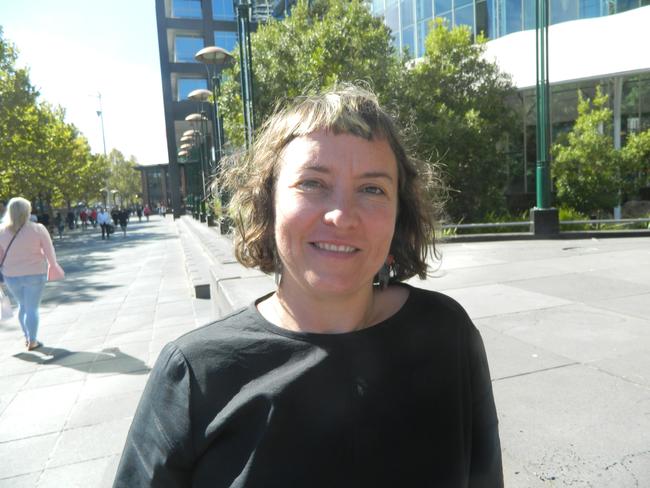
Facebook’s greatest regulatory threat may come from the European Union, however, where a probe into the social network has been ongoing, and General Data Protection Regulations (GDPR) will roll out on May 25, demanding users give express and informed consent to use of their personal information.
Countries including The Netherlands, Norway, Greece, Italy, Spain, and Portugal also simultaneously filed complaints about Facebook breaking data privacy laws late on Friday.
And in the face of regulations from several countries, Zuckerberg seems to be making some concessions about the network he founded 14 years ago.
After initial hesitation, he told reporters the same privacy “controls and settings” rolled out to meet new European standards would be made “available everywhere, not just in Europe,” though they may take a different “format”.
“Overall, I think regulations like the GDPR are very positive,” he says.
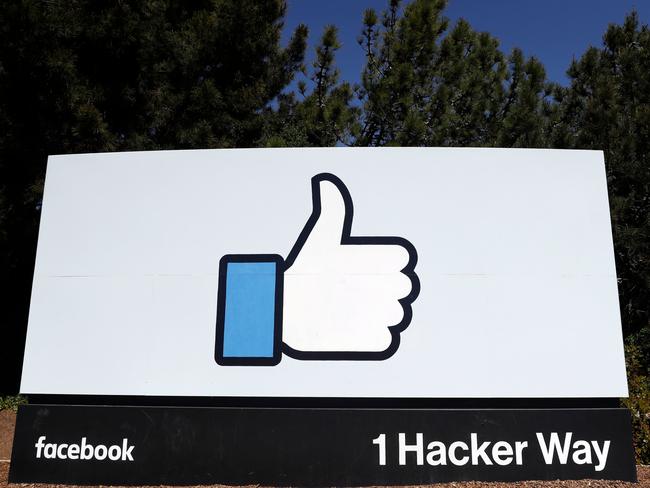
“We need to figure out what makes sense in different market with the different laws.”
Zuckerberg also told CNN he would “love to see” regulation around advertising transparency for digital platforms and, on Saturday, revealed new rules for verifying political and issue-based advertisers, and making ads available for public scrutiny.
Changes coming to Facebook next week will also let Australians find out whether their personal information was potentially used by Cambridge Analytica, and will restrict third parties from accessing some user information such as “religious or political views, relationship status and details, custom friends lists” and even users’ fitness activity.
The ability to search for Facebook users with phone numbers or email addresses will also be curtailed, as the company revealed “malicious actors have abused these features to scrape public or file information,” in a move that may have affected most Facebook users.
More changes are likely to be rolled out to address privacy issues, Zuckerberg says, but current concerns could take years to fully address.
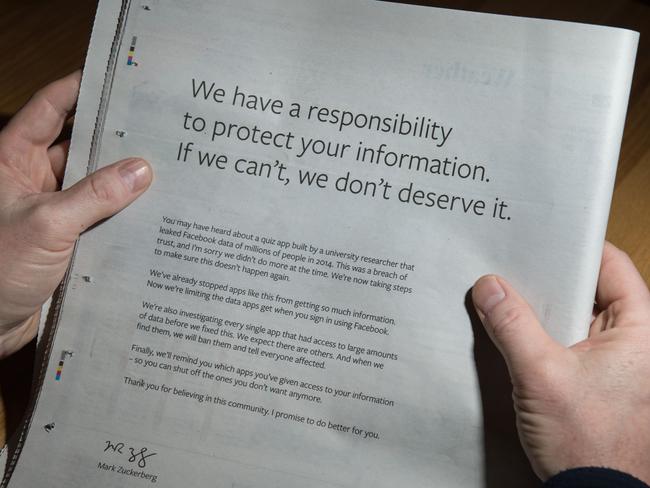
“I wish that I could snap my fingers and in three or six months have solved all these issues,” Zuckerberg says. “But I just think the reality is, given how complex Facebook is ... this is a multi-year effort.”
Facebook will also need to address emerging claims, however, including revelations it sought health data about patients from US hospitals and, without warning, deleted private messages Zuckerberg sent to journalists.
Gloss Marketing director and social media expert Megan Del Borrello says despite the changes, Australians users will see a very similar Facebook in two years’ time unless they take action.
“No user thinks about their data until something like this happens. You don’t realise how much data they have on you,” she says. “It’s probably a good time to have a look at all the information they’ve collected from you and your phone.”

